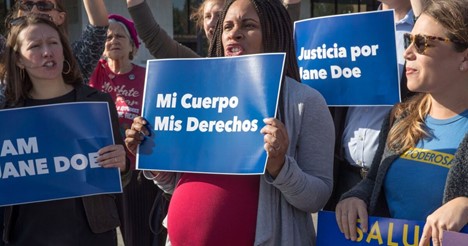
Latinos on the front lines of providing abortions under increasingly restrictive state anti-abortion laws said that the leaked opinion signals an end to abortion access and that it would disproportionally affect Latinx people and other communities of color.
After Monday’s leak of a draft U.S. Supreme Court opinion that would overturn Roe v. Wade, the landmark law that legalized abortion, volunteer work, like the one Omar Casas does with South Texans for Reproductive Justice, becomes more necessary. When Texas implemented its restrictive abortion law in 2021, Casas, was busy distributing packets with Plan B contraceptive pills and condoms. Volunteers fear that even though abortion rights were targeted first, it is likely that emergency contraception and birth control will be targeted next.
Organizations such as the National Latina Institute for Reproductive Justice have been dealing with the fallout from Texas’ ban and other pieces of legislation restricting abortion. Those in need of an abortion who could scrape together money, time off work, and childcare have been going out of the state to receive abortions. Abortion rights advocates have rushed to put together the money to help pay for Latinas who are forced to travel out of state for those services.
However, many Latinx people in states with border regions have been unable to do the same. Those who are undocumented risk deportation if they travel more than 100 miles into the interior, where Border Patrol checkpoints are set up, or if they try to travel out of the country.
Tania Unzueta, the Political Director and a Co-Founder of the Latino advocacy group Mijente expressed, “I think about the immigrant women I met in the poultry plants in south Georgia, who have to drive hours to go to a clinic just to even get a checkup. We are talking about abortion, but this will impact access to reproductive health services in our communities.”
Unzueta said some Latinos have a deeper understanding of the dangers behind abortion bans because of their experiences with how those bans have affected women in Latin America and the Caribbean. Her parents shared stories with her about the struggles that her relatives in Mexico faced when they tried to get an abortion.
Lupe M. Rodríguez, the Director of the National Latina Institute for Reproductive Justice, highlighted last month’s attempt in Texas to prosecute a Latina woman on a murder charge after authorities accused her of causing a person’s death by self-induced abortion. The case eventually was dismissed.
“These are dark times, and dark times are ahead of us. But we’ve been in these situations before…We have to continue fighting,” concluded Nancy Cárdenas Peña, the Texas Director for Policy and Advocacy at the National Latina Institute for Reproductive Justice.

Recent Comments